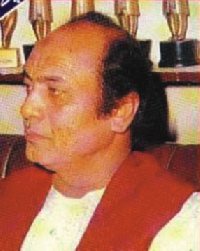All Time Greats
Mehdi Hasan: The ghazal king reigns supreme
Music fads may come and go, but the ghazals of Mehdi Hasan linger on in the memory. Even amidst the current cacophony of loud, jarring tunes and remixes, his songs have an everlasting appeal.The main ingredient of Hasan's success is his careful choice of ghazals. In addition, his thorough knowledge of music has helped him render many a raga meticulously and in a wide range of styles such as Dhrupad, Thumri or Dadra. According to the critics, only Hasan could have rendered classics such as Mujhe tum nazar se gira to rahe ho in Doraha (1967) or Yeh wafaon ka diya aapne in Phir Chand Nikle Ga (1970). His songs from Jawab Dua (Zindagi ja, chod de peecha mera) or Daagh (Tum zid to kar rahe ho) are but some examples of his memorable songs. His much-awaited latest album, Sada-e-Ishq, has Hasan and poet Farat Shahzad coming together for a second time. Known for his passionate poetry, Shahzad has written eight delightful ghazals in this album. The tunes have been composed by Altaf-e-Haider. This promises to be a memorable album not just because of beautiful ghazals like Humse tanhai ke mare or Pyaar karne ki is dil ko but because age is catching up with Hasan. However, the Shahenshah-e-Ghazal (as he is popularly known) retains the ability to spring many a musical surprise on his audience. Hasan was born into a musically inclined family in a town called Luna in Rajasthan, 107 miles from Jaipur. His father was Azim Khan but his uncle, Ismail Khan, who had attended the Bhatkhande college in Lucknow, took the six-year-old under his wings and started training him in the arts of singing and wrestling. Hasan was an adept singer even as a child and began his career as a radio artiste. Later, he started singing ghazals. He struck gold with his very first ghazal Mera khayal in the film Shikaar (1962). Coupled with his soothing voice and perfect rendition, his rise was meteoric. There was no looking back after that. Later on in life, his elder brother, Ghulam Qadir, fondly called Punditji, had a great influence over him. He composed most of Mehdi Hasan's ghazals, including Gulon mein rang bharay baad-i-naubahar chalay, which was recorded in Lahore in 1959 and became an instant hit. Mehdi Hasan was no Ustad in the classical sense of the word, but he was every Ustad's favourite singer, and they loved and respected him for his control over sur and taal, as well as his knowledge of classical music. Listen to his live concerts of "classical ghazals in rare ragas" in which Ustads of the calibre of sarangi nawaz Sultan Khan of India and tabla nawaz Shaukat Husain Khan of Pakistan accompanied him. Compiled by Cultural Correspondent
|

|